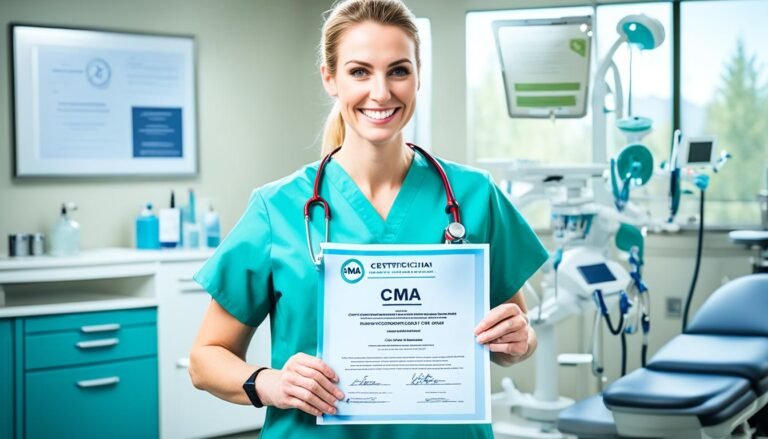Top Benefits of the Women’s Health Clinical Specialist (WCS) Certification
As of June 2023, we have 773 certified Women’s Health Clinical Specialists. This number shows the field’s growth and need. Healthcare experts in women’s health therapy are more important than ever. The Women’s Health Clinical Specialist (WCS) Certification helps physical therapists move forward in their careers. It lets them specialize in women’s health.
Key Takeaways:
- Obtaining the WCS Certification can enhance career prospects and provide opportunities for specialization in women’s health physical therapy.
- The certification demonstrates advanced knowledge in foundational science, behavioral science, clinical science, client management, and practice management specific to women’s health.
- Physical therapists can work in hospitals, clinics, private practices, and research institutions, focusing on treating specific conditions, conducting research, teaching, or providing community education in women’s health.
- Completing a post-professional clinical-based residency or participating in continuing education can contribute to professional development in women’s health physical therapy.
- Women’s Health Clinical Specialists play a crucial role in providing specialized care for women with various health issues, including gynecological and reproductive conditions, female sexual health, pregnancy and postpartum care, and preventive healthcare.
History and Application Requirements
Since 2006, the Women’s Health Clinical Specialist certification has empowered health workers. It is approved by the American Physical Therapy Association (APTA). Starting with its first test in 2009, it has become a symbol of deep knowledge and skill in women’s health.
Application Requirements
Physical therapists aiming for this certification need to meet specific criteria. These ensure they have the right qualifications and experience for women’s health practice.
- License to Practice: Candidates must have a permanent or unrestricted therapy license.
- Direct Patient Care Hours: They must document 2,000 direct patient care hours within 10 years. Of these, 500 hours must be within the last 36 months.
Another way to qualify is through a post-professional residency. This residency must be with the APTA in the last decade. This path recognizes the value of specialized training through such programs.
This certification’s roots are in the drive for excellence in women’s health therapy. Its high application standards show dedication to improving women’s care in all health facilities.
Examination Overview
The Women’s Health Clinical Specialist exam is a big test. It quizzes you on your know-how, patient care, and what’s expected of pros in women’s health physical therapy. It has about 200 questions, looking into many health problems and subjects in women’s health.
This exam checks if you’re skilled in key areas of women’s health physical therapy. It makes sure certified Women’s Health Specialists can give top-notch care to women who need various healthcare services.
To understand more about the test’s format and content, take a look at the sample table below:
| Topic | Number of Questions |
|---|---|
| Bowel Dysfunction | 25 |
| Sexual Dysfunction | 20 |
| Lymphedema | 15 |
| Urinary Dysfunction | 30 |
| Musculoskeletal Dysfunction | 25 |
| Pregnancy & Postpartum Issues | 40 |
| Pelvic Floor Issues | 35 |
| Other Related Conditions | 10 |
The table shows how the exam covers many topics. This ensures Women’s Health Specialists are ready to handle various aspects of women’s health.
Get ready for the exam by learning about these topics and how they are asked in the test. Doing well in the Women’s Health Specialist certification will boost your career. It will also open up new chances in the field of women’s health physical therapy.
Role and Designation Specification
Women’s Health Clinical Specialists are key in offering special care for women’s health. They are experts in dealing with issues like female reproduction and sexuality, breast health, pregnancy, and preventive healthcare. Their work covers all stages of a woman’s life.
They make a big difference by focusing on women’s unique health needs. Their wide knowledge means they can support women fully at any life stage.
A Women’s Health Specialist is rightly called “Jane Doe, PT, DPT, Board-Certified Clinician in Women’s Health Physical Therapy”. This shows their deep expertise in physical therapy for women’s health.
| Role of Women’s Health Specialist | Designation Specification |
|---|---|
| Provide specialized care in women’s health | Jane Doe, PT, DPT, Board-Certified Clinician in Women’s Health Physical Therapy |
| Evaluate and treat gynecological and reproductive issues | |
| Address female sexual health concerns | |
| Ensure breast health and provide preventive care | |
| Offer comprehensive pregnancy and postpartum care |
These specialists greatly help women lead healthier lives. They are crucial in improving women’s health overall.
Educational Requirements and Career Options
To become a Women’s Health Clinical Specialist, physical therapists must finish classes in many areas. This includes subjects like anatomy, biology, and psychology. Many universities have special programs for this type of physical therapy. After graduating, there are jobs in hospitals, clinics, or you can start your own practice.
Women’s Health Specialists help treat issues like pelvic floor problems or urinary incontinence. They can also do research or help create better treatments. Some even teach others to become Women’s Health Specialists. This way, they pass on valuable skills and knowledge.
| Career Options | Educational Requirements |
|---|---|
| Hospitals | Completion of a Doctor of Physical Therapy (DPT) program, followed by specialization in women’s health physical therapy |
| Clinics | Graduation from an accredited physical therapy program with a focus on women’s health |
| Private Practices | Advanced coursework and specialized training in women’s health physical therapy |
| Research Institutions | Advanced degrees, such as a Master’s or Ph.D., with a research focus in women’s health |
Helping women at all life stages is the main goal of Women’s Health Specialists. They support women from pregnancy to overcoming surgeries. Their work is very rewarding and crucial.
Learning doesn’t stop after graduation for Women’s Health Specialists. They keep up with new studies and attend events. Getting special certifications also helps them offer better care.
By getting more education and exploring different jobs, Women’s Health Specialists can really change the game. They improve health care for women and work to keep them healthy.
Residency Programs and Alternatives
Many physical therapists pick residency programs in women’s health physical therapy. These programs help them learn more in this field. They get to work closely with experts in prestigious places to improve their skills.
Residencies offer a deep dive into women’s health topics. This includes things like issues with the pelvic floor, care before and after pregnancy, and gynecological problems. By working on real cases and doing research, therapists get very skilled at helping women.
But, not everyone can do a residency. They require a lot of time, sometimes a few months to a couple of years. This makes it hard for some therapists who have other things going on in their lives.
Yet, if residencies don’t fit, there are other paths. Therapists can ask to do extra education at work. This might include going to conferences or taking courses to improve in women’s health therapy.
Getting advice from experienced therapists is also smart. They can offer tips, share their knowledge, and help therapists grow. It’s like having a personal teacher.
Another good step is taking certification exams. These test a therapist’s deep knowledge in women’s health. Passing them shows you really know your stuff.
Teaching the community is a rewarding choice too. By leading workshops or giving talks, therapists can spread the word about women’s health. They can share how physical therapy helps women feel better.
Comparison of Residency Programs and Alternative Options
| Residency Programs | Alternative Options |
|---|---|
| Intensive training and mentorship | Continuing education opportunities |
| Structured learning environment | Mentorship from experienced clinicians |
| In-depth knowledge in women’s health | Participation in certification exams |
| Hands-on clinical experience | Providing community education |
| Time commitment | Flexibility for personal and professional obligations |
“Residency programs offer a valuable opportunity for physical therapists to immerse themselves in women’s health physical therapy and gain specialized knowledge. However, alternatives such as continuing education, mentorship, and community education provide flexibility and diverse pathways for professionals to grow and excel in this dynamic field.”
Residency programs are just one way to grow in women’s health therapy. There’s also learning from mentors, doing extra education, and teaching others. By always learning, working together, and being creative, therapists can really help improve women’s health and their own field.
Benefits of Residency Programs
Residency programs for Women’s Health Specialists bring many good things. They let physical therapists focus on women’s health more. These programs let therapists learn a lot from experts. They learn in a well-organized and complete way, picking up important insights and skills.
Hands-On Experience and Learning
In a residency, therapists see and join in different medical procedures. This includes surgeries. Such experiences help them understand women’s health better and learn how to treat it. They also take part in grand rounds and work with experts from many fields, which is great for patient care.
Financial Support for Continuing Education
Residencies often help therapists pay for more education. This funding lets them keep up with new ideas in women’s health therapy. The education may include learning new treatment methods and keeping up with current research.
Preparation for Certification Exams
Residency programs get therapists ready for special exams, like the Women’s Health Clinical Specialist (WCS) Certification. The training they get is thorough. It gives them the knowledge and skills to do well in the certification.
Enhanced Career Prospects
After finishing a residency, therapists become more appealing to employers. They stand out in job searches. Employers know that experience in such a program is very valuable.
Residency programs offer a mix of training, financial help for more education, and better job chances. With these, physical therapists focusing on women’s health make big positive differences. They improve how women get care and push women’s health therapy forward.
| Benefits of Residency Programs | Description |
|---|---|
| Hands-On Experience and Learning | The opportunity to observe medical procedures, attend grand rounds, and collaborate with healthcare professionals from various specialties. |
| Financial Support for Continuing Education | Residency programs often offer financial assistance for therapists to pursue continuing education courses, keeping them updated with the latest advancements in women’s health physical therapy. |
| Preparation for Certification Exams | Residency programs provide comprehensive training that aligns with the requirements of certification exams such as the Women’s Health Clinical Specialist (WCS) Certification. |
| Enhanced Career Prospects | Completing a residency program at a renowned institution enhances a therapist’s resume and improves their job prospects in the field. |
Life After Residency
Completing a residency program opens many career doors for Women’s Health Specialists. The program gives them skills and knowledge to do well in their work. It helps them achieve success after they finish their residency.
Many choose to start their own clinics focused on women’s health. With specialized knowledge, they can offer care customized to fit their patients’ needs. This can greatly change women’s lives for the better.
Teaching is another path some Women’s Health Specialists take. They can pass on their wisdom to the next generation of therapists. Teaching jobs are often found in schools and training institutions.
Some love the chance to do research. They might work on clinical trials or join research teams. This work can lead to publications and push the field forward.
There are also chances to lead in healthcare. Specialists may lead in improving health services for women within their workplaces. They can focus on quality to better patients’ health outcomes.
After residency, they can still grow by creating courses, teaching, and writing. By staying updated in their field, they continue to build on their success. This keeps them at the top of their game in helping women’s health.
Quote:
“The opportunities for Women’s Health Specialists after residency are abundant. Whether it’s starting your own practice, conducting research, or taking on leadership roles, there is no shortage of ways to make a meaningful impact in women’s health.” – Dr. Sarah Johnson, Women’s Health Clinical Specialist
| Path | Opportunities |
|---|---|
| Starting a niche practice | Provide specialized care, make a significant impact on patients |
| Teaching positions | Educate future physical therapists, shape the next generation |
| Research opportunities | Contribute to advancing knowledge, participate in clinical trials |
| Leadership roles | Shape women’s health services, drive quality initiatives |
| Continuing education | Write courses, teach, specialize in other areas of women’s health |
For Women’s Health Specialists, life after residency is full of chances to support women’s health. Their special skills and ongoing professional growth play a key role. They help improve women’s lives and push the field of women’s health therapy forward.
Quasi-Residency Experience and Continuing Education
Not everyone can join a formal residency for women’s health therapy. But if you skip this, there are other great ways to boost your skills. Here’s how:
- Negotiating Continuing Education Opportunities: Ask your boss for chances to learn more. This could mean going to special classes or events about women’s health. Negotiating for this with your job can broaden your skills.
- Attending Conferences and Workshops: Going to events like conferences and workshops helps you learn and connect. They’re great for keeping up with new info and meet experts in the field.
- Seeking Mentorship: Finding a mentor can really help. They can share their wisdom and experience working in women’s health. It’s a smart move for anyone looking to expand their knowledge.
- Participating in Certification Exams: Taking certification exams is another good step. Tests like the PRPC or WCS show you have deep knowledge in your field. It’s a clear way to prove your skills.
- Providing Community Education: Teaching public classes is rewarding. It helps spread helpful information about women’s health. Workshops and support groups are also good for community health.
It’s key to build strong relationships with other local health experts. And, keep on top of new studies and books. This is essential to always be growing in your profession as a Women’s Health Specialist.
Transformational Continued Learning
Never stop learning if you work in women’s health therapy. Seeking new knowledge and skills is vital. It helps you offer top-quality care and keep up in this ever-changing field.
Conclusion
The Women’s Health Clinical Specialist (WCS) Certification is great for physical therapists who focus on women’s health. It helps them grow in their careers and learn more about the field. This certification allows them to choose how to broaden their knowledge, whether through official programs, other learning opportunities, or just continuing to study.
Getting the WCS Certification means more than just personal growth and better job options. It also means professionals can truly help women. They keep learning, working with others, and getting involved in their community. This way, they improve women’s health care while offering the best help to their patients.
To wrap up, the WCS Certification is very important for therapists wanting to specialize in women’s health. It offers many advantages. By always learning and keeping up with new methods, Women’s Health Specialists can do a lot for women and help develop their field.
FAQ
Q: What are the benefits of obtaining the Women’s Health Clinical Specialist (WCS) Certification?
Q: When was the Women’s Health Clinical Specialist certification approved?
Q: What are the requirements to become a Women’s Health Clinical Specialist?
Q: What does the Women’s Health Clinical Specialist examination evaluate?
Q: What is the role of a Women’s Health Clinical Specialist?
Q: What are the educational requirements for becoming a Women’s Health Clinical Specialist?
Q: What are the career options for Women’s Health Clinical Specialists?
Q: What are the benefits of Women’s Health Specialist residency programs?
Q: What can Women’s Health Specialists do after completing a residency program?
Q: What are the alternatives to residency for becoming a Women’s Health Clinical Specialist?
Q: Why should I consider becoming a Women’s Health Clinical Specialist?
Source Links
- https://coloradophysicaltherapynetwork.com/womens-certified-specialist-wcs/
- https://epiprod.specialization.apta.org/become-a-specialist/womens-health
- https://www.aptapelvichealth.org/info/is-a-womens-health-residency-program-right-for-you

Our Healthcare Editorial Team is composed of subject matter experts and seasoned healthcare consultants who bring decades of combined experience and a wealth of academic qualifications. With advanced degrees and certifications in various medical and healthcare management fields, they are dedicated to supporting the personal and career development of healthcare professionals. Their expertise spans clinical practice, healthcare policy, patient advocacy, and public health, allowing us to offer insightful, well-researched content that enhances professional growth and informs practice.
Disclaimer
The client education section of our blog is intended to support healthcare providers by offering informational resources for patient education. However, this information is not meant to serve as medical advice. We advise healthcare professionals to ensure all content is consistent with their clinical knowledge and confirm with current medical standards before using it in their practice or advising patients. For specific medical issues, always refer to professional guidance and standards of care.
For any legal matters or specific medical concerns, we strongly recommend consulting with a qualified legal professional or referring to government websites for authoritative information.







